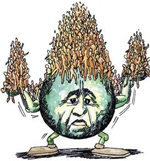Holy Bureaucratic Gibberish, Batman!
This post is by Adam Martin, a post-doctoral fellow at DRI. On July 1 the Department of Defense rolled out two notable new projects that will undoubtedly inaugurate a new era of peace and safety for the streets of Gotham international community. Even the world’s greatest detective could not have seen this coming.
 Like their caped crusader namesakes, the DoD versions of BaTMAN and RoBIN are shrouded in mystery, their real identities cleverly disguised. BaTMAN is:
Like their caped crusader namesakes, the DoD versions of BaTMAN and RoBIN are shrouded in mystery, their real identities cleverly disguised. BaTMAN is:
Biochronicity and Temporal Mechanisms Arising in Nature (BaTMAN) could develop an understanding of the relationship between biological systems and the spatial-temporal universe through the application of advanced principles from the physical sciences... Topic areas that may be of interest include, but are not limited to: quantum biology and molecular clocks; resetting and synchronization of biological clocks and rhythms; microscale recapitulation in macroscale; evolutionary pressure and time; physiological signal processing and clocks; timing and cognition; and robustness of clocks in development.
His faithful sidekick RoBIN:
Robustness of Biologically-Inspired Networks (RoBIN), seeks to apply the critical control features of biological networks to build unique models for adaptable networks, and create a dynamic biologically-inspired network of scientists and other experts for crisis response and complex decision support.
What does any of this have to do with foreign aid? Most prominently, it serves of a reminder of just how bad an idea it is to ask the military to be more involved in aid. Despite the distilled frenzy of a few prominent voices in the air, the defense establishment is more likely to lead us into a funhouse maze than solve the riddle of development.
But it’s not just military involvement itself that should resisted. The BaTMAN and RoBIN projects are perfect examples of the obfuscating language and flagrant non-accountability that accompanies bloated bureaucracies. These megalomaniacal ideas work great at keeping the funding flowing but achieve little else. The dynamic duo of massive government budgets and weak feedback mechanisms are a source of mischief in military and non-military organizations alike.
----
Editor’s note: BaTMAN and RoBIN sound almost too outlandish to be real. We did call Defense Advanced Research Projects Agency (DARPA) to confirm that we were not being had, and the conversation went like this:
Me: Hi, I work at New York University and write for a blog called Aid Watch.
DARPA: OK?
Me: I am wondering if you could confirm that Biochronicity and Temporal Mechanisms Arising in Nature and Robustness of Biologically-Inspired Networks are in fact DARPA programs.
DARPA: Uhmmm...you want to try that in English? (laughs)
Me: Your language, not mine! The acronyms are BaTMAN and RoBIN...
DARPA: (Looks up the programs on his screen…) Well, what we issued was a Request for Information so they are not technically programs per se....They are potential new DARPA programs.
Me: So you can confirm that they are real potential DARPA programs.
DARPA: Yes.
There you have it, BaTMAN and RoBIN are not a spoof.
 From Aid to Equality
From Aid to Equality





